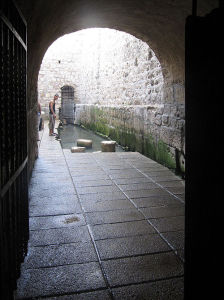SUKKOT: The Significance of Water, Land and the Agricultural Cycle
Matia Kam

The festival of Sukkot and the Eighth Day, Shmini Atzeret signify the end of the first month’s festivals in the Jewish calendar and the end of the agricultural year: “the year in Torah is an agricultural one, it begins with seeding, and the first rain.”[1] In Jewish tradition the year begins on Rosh Hashanah, yet in Torah Sukkot marks the end of the agricultural year, and the beginning of new planting cycle. Sukkot is the time of harvest in which farmers gather the crops [Exodus, 23:16]. Preparations for the new seeding of the fields awaken farmers concern about rain, not knowing if the new year would see rain, or would face drought; if there would be rains of blessing or disastrous storms. Accordingly, water rituals were performed in the Temple in Jerusalem on Sukkot, and the prayer for rain is customarily recited on the Eight day (Simhat Torah). The festival of Simhat Torah marks an end and a beginning, the end of a yearly cycle of Torah reading in the synagogue and a beginning in the reading of Genesis.
Water Celebrations on Sukkot
While the land of Israel is not rich in natural resources and water in particular, it has been since ancient times, an agricultural place dependent on rain. Torah emphasizes, “the land that you are about to inherit…would drink rain water: [Deuteronomy, 11:11]. The Jewish society of the Second Temple period was agrarian, and needed the right kind of rain for survival. According to tradition, “on the Feast of Tabernacles judgment is passed concerning the water [rain]”[2] and this gave rise to various customs to celebrate rain on Sukkot in the Temple in Jerusalem, to ensure a successful harvest.
Liturgies for Rain and for Blessing the Earth with Abundance
The end of Sukkot marked by Simhat Torah signifies the beginning of winter, and therefore includes the custom of special prayers – Medieval liturgical poems – for rain. There are some differences between Ashkenazi and Sephardi liturgies, yet the petition is the same: asking that God would provide the right amount of rain at the right time, beneficial rains that would be good for the earth and the people. Around the world and in all synagogues Jews pray for rain in the land of Israel and for rain in every land asking God to “grant dew and rain to bless the earth with abundance.”
[1] Joel Bin-Nun, “Rosh Hashana or the beginning of the Year?”, in: Amnon Bazak (ed), beRosh Hashana Yikatevun”‘ Tvunot Publishing house, 2003, p. 12.
[2] Mishna, Treatise Rosh Hashana, chapter 1, translated by D. A. Sola and M. J. Raphall
Translated from the Hebrew by Ayala Emmett